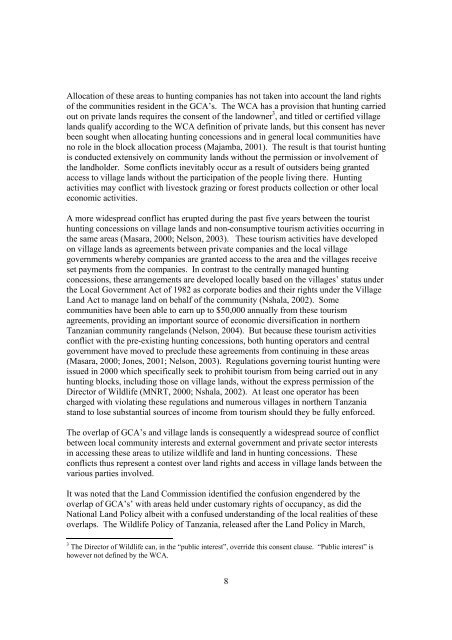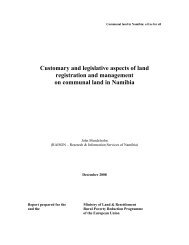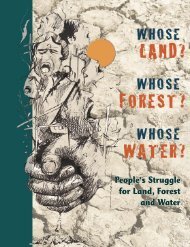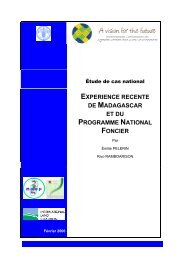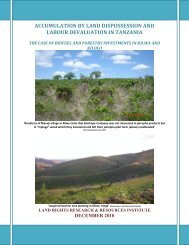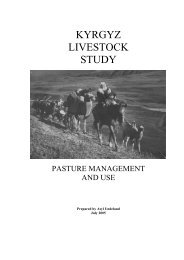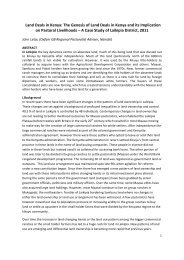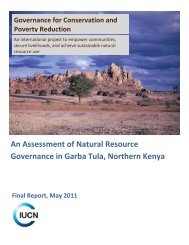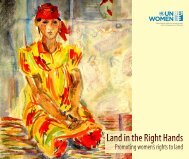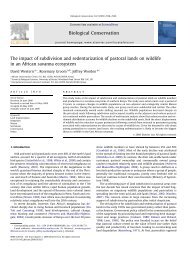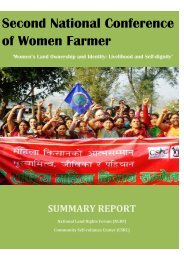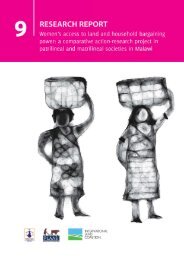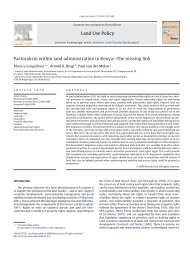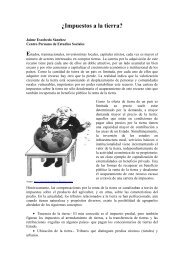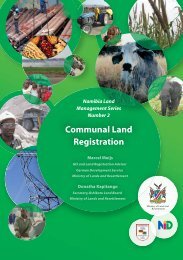Wildlife Management and Village Land Tenure in ... - Land Portal
Wildlife Management and Village Land Tenure in ... - Land Portal
Wildlife Management and Village Land Tenure in ... - Land Portal
Create successful ePaper yourself
Turn your PDF publications into a flip-book with our unique Google optimized e-Paper software.
Allocation of these areas to hunt<strong>in</strong>g companies has not taken <strong>in</strong>to account the l<strong>and</strong> rights<br />
of the communities resident <strong>in</strong> the GCA’s. The WCA has a provision that hunt<strong>in</strong>g carried<br />
out on private l<strong>and</strong>s requires the consent of the l<strong>and</strong>owner 3 , <strong>and</strong> titled or certified village<br />
l<strong>and</strong>s qualify accord<strong>in</strong>g to the WCA def<strong>in</strong>ition of private l<strong>and</strong>s, but this consent has never<br />
been sought when allocat<strong>in</strong>g hunt<strong>in</strong>g concessions <strong>and</strong> <strong>in</strong> general local communities have<br />
no role <strong>in</strong> the block allocation process (Majamba, 2001). The result is that tourist hunt<strong>in</strong>g<br />
is conducted extensively on community l<strong>and</strong>s without the permission or <strong>in</strong>volvement of<br />
the l<strong>and</strong>holder. Some conflicts <strong>in</strong>evitably occur as a result of outsiders be<strong>in</strong>g granted<br />
access to village l<strong>and</strong>s without the participation of the people liv<strong>in</strong>g there. Hunt<strong>in</strong>g<br />
activities may conflict with livestock graz<strong>in</strong>g or forest products collection or other local<br />
economic activities.<br />
A more widespread conflict has erupted dur<strong>in</strong>g the past five years between the tourist<br />
hunt<strong>in</strong>g concessions on village l<strong>and</strong>s <strong>and</strong> non-consumptive tourism activities occurr<strong>in</strong>g <strong>in</strong><br />
the same areas (Masara, 2000; Nelson, 2003). These tourism activities have developed<br />
on village l<strong>and</strong>s as agreements between private companies <strong>and</strong> the local village<br />
governments whereby companies are granted access to the area <strong>and</strong> the villages receive<br />
set payments from the companies. In contrast to the centrally managed hunt<strong>in</strong>g<br />
concessions, these arrangements are developed locally based on the villages’ status under<br />
the Local Government Act of 1982 as corporate bodies <strong>and</strong> their rights under the <strong>Village</strong><br />
L<strong>and</strong> Act to manage l<strong>and</strong> on behalf of the community (Nshala, 2002). Some<br />
communities have been able to earn up to $50,000 annually from these tourism<br />
agreements, provid<strong>in</strong>g an important source of economic diversification <strong>in</strong> northern<br />
Tanzanian community rangel<strong>and</strong>s (Nelson, 2004). But because these tourism activities<br />
conflict with the pre-exist<strong>in</strong>g hunt<strong>in</strong>g concessions, both hunt<strong>in</strong>g operators <strong>and</strong> central<br />
government have moved to preclude these agreements from cont<strong>in</strong>u<strong>in</strong>g <strong>in</strong> these areas<br />
(Masara, 2000; Jones, 2001; Nelson, 2003). Regulations govern<strong>in</strong>g tourist hunt<strong>in</strong>g were<br />
issued <strong>in</strong> 2000 which specifically seek to prohibit tourism from be<strong>in</strong>g carried out <strong>in</strong> any<br />
hunt<strong>in</strong>g blocks, <strong>in</strong>clud<strong>in</strong>g those on village l<strong>and</strong>s, without the express permission of the<br />
Director of <strong>Wildlife</strong> (MNRT, 2000; Nshala, 2002). At least one operator has been<br />
charged with violat<strong>in</strong>g these regulations <strong>and</strong> numerous villages <strong>in</strong> northern Tanzania<br />
st<strong>and</strong> to lose substantial sources of <strong>in</strong>come from tourism should they be fully enforced.<br />
The overlap of GCA’s <strong>and</strong> village l<strong>and</strong>s is consequently a widespread source of conflict<br />
between local community <strong>in</strong>terests <strong>and</strong> external government <strong>and</strong> private sector <strong>in</strong>terests<br />
<strong>in</strong> access<strong>in</strong>g these areas to utilize wildlife <strong>and</strong> l<strong>and</strong> <strong>in</strong> hunt<strong>in</strong>g concessions. These<br />
conflicts thus represent a contest over l<strong>and</strong> rights <strong>and</strong> access <strong>in</strong> village l<strong>and</strong>s between the<br />
various parties <strong>in</strong>volved.<br />
It was noted that the L<strong>and</strong> Commission identified the confusion engendered by the<br />
overlap of GCA’s’ with areas held under customary rights of occupancy, as did the<br />
National L<strong>and</strong> Policy albeit with a confused underst<strong>and</strong><strong>in</strong>g of the local realities of these<br />
overlaps. The <strong>Wildlife</strong> Policy of Tanzania, released after the L<strong>and</strong> Policy <strong>in</strong> March,<br />
3 The Director of <strong>Wildlife</strong> can, <strong>in</strong> the “public <strong>in</strong>terest”, override this consent clause. “Public <strong>in</strong>terest” is<br />
however not def<strong>in</strong>ed by the WCA.<br />
8


